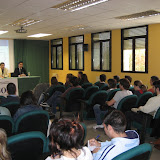Adobe and the PDF role in Open Data context
Note: This article is a translation of what I wrote in Spanish for my personal blog. You can see the original post in Spanish: "El papel de Adobe y los PDF dentro del panorama Open Data".
Last week in Brussels a lot what was discussed about Open Data in the Share PSI Workshop, but I also had a number of interesting conversations in the time between sessions. As I said, one issue that caught my attention was the attendance of large technology companies at an event about Open Data. Some like IBM and Orange made their presentations based on the position papers they had sent, and others like Adobe were attending with relevant representatives. So far I had only identified the work done by Microsoft to enter the scene with its OGDI initiative, aimed at positioning Azure as an opendata friendly technology and the occasional attendance at relevant Open Data events from for example Telefonica or Google, but with a very low profile activity.As I wrote, this step forward from large technology companies, which I think has very much to do with the work of ETSI and W3C, will be for good if we manage to focus their interests in the right direction, that is to say Open Data, but well done. And that's what this post is about. One of the topics that myself in my presentation about Euroalert, and others like Chris Taggart or François Bancilhon stressed, was the fact that the release of public sector data in Adobe PDF format is not adequate for reuse. It is clearly the best format for distributing information (reports, documents, presentations, etc.) but, as HTML itself, not to publish datasets or machine readable information.
Mr Marc Straat spoke from the public to tell us how Adobe is working on PDF technology so it can evolve to be a more useful format within the Open Data context. I must admit that I did not know about the potential of PDF as a container for other types of information, and after reading the article My PDF Hammer that Marc talked me about in a very pleasant conversation over lunch, I think I have a clear idea of what he meant.
I find very interesting the idea that a PDF container may associate the usual PDF file with its editable original version, whatever format it comes from: either a Microsoft Word document (.Doc), OpenOffice or LibreOffice (.Odt), or whatever. If Adobe works to promote that all the tools that convert documents to PDF do the job of embedding the source file, and contributes to disseminate and encourage the use of the feature, I think it would be a great step forward. And excellent news if the governments take as common practice the distribution of their reports in PDF along with the original file and datasets within the PDF file as a container.
However, after thoroughly reading the article, the idea of using PDF as a container for open data files, seems to me an even worse idea than in my first thought. I really see no advantage in using a PDF container instead of a simple ZIP file to distribute XML datasets along with XSD schemas and their documentation or manuals of course in PDF.
On the other hand I do see a major drawback. No programming language has native support for processing PDF files, while there are many options (and well known) for dealing with ZIP and of course XML, XSD or plain text. This means that an almost trivial data processing task, for which exist many well known open source tools, could be turned into a problem that will require licenses and very specific knowledge with no additional benefit for developers in exchange.
As a conclusion, I will say that I do not believe that solutions based on PDF as a container for open data should be promoted. Considering existing tools, it is much more practical for re-users to deal with information distributed in ZIP containers. Instead, it seems a great idea to start encouraging the practice of embedding the original files and even XML datasets within PDF reports or documents to facilitate reuse.
By the way, as a Linux user, I keep waiting for a version of Adobe Acrobat Reader for my platform (x86_64). At present I am not able to open most of the files that make use of advanced PDF features such as forms, published by public authorities.









